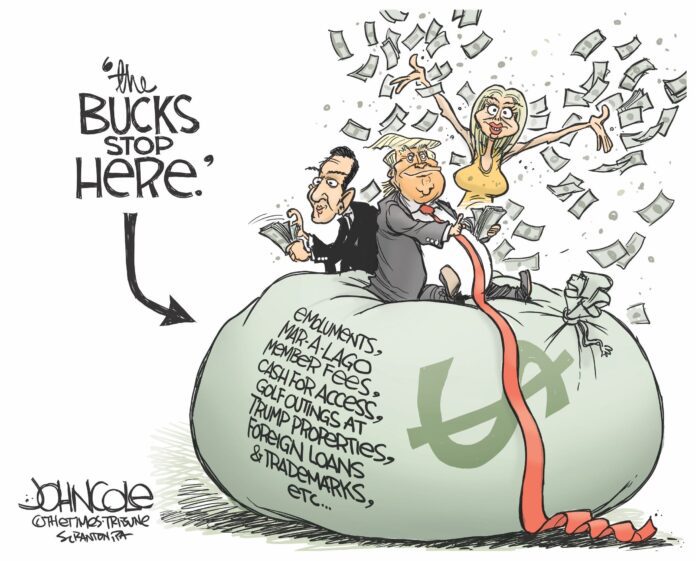In early July, Sen. Bob Menendez, D-NJ, was convicted on 16 counts of what prosecutors painted as a deliberate plan to trade the influence he once wielded as head of the Senate Foreign Relations Committee for payoffs from foreign countries.
Among the bribes he was deemed guilty of accepting were gold bars worth more than $100,000 and a Mercedes Benz for his wife – also facing charges and whom Menendez’s lawyers claimed was the real culprit. When federal law enforcers raided his home, they found nearly a half million dollars in cash, much of it stuffed in coat pockets and envelopes.
Senate Majority Leader Chuck Schumer called upon Menendez to resign or face expulsion. Menendez was running for re-election as an Independent after the initial fall-out from his indictment made him persona non grata within the party.
He said he planned to appeal. But he later said he would resign effective next month.
“This wasn’t politics as usual, this was politics for profit,” said Damian Williams, an attorney for the Southern District of New York. “Now that the jury has convicted Bob Menendez, his years of selling his office to the highest bidder have finally come to an end.”
Politics for profit. That has a familiar ring to it. But why waste time with a senator when a president is available.
Citing the Constitutional prohibition that “no Person holding any Office of Profit or Trust under them, shall, without the Consent of the Congress, accept of any present, Emolument, Office, or Title, of any kind whatever, from any King, Prince, or foreign State,” the report noted:
“Through entities he owned and controlled, President Trump accepted, at a minimum, millions of dollars in foreign emoluments in violation of the United States Constitution.
“President Trump’s businesses received, at a minimum, $7.8 million in foreign payments from at least 20 countries during his presidency.
“President Trump never sought or received Congress’s approval to keep these foreign payments, as the Constitution requires.”
Except for trying to overthrow the government on Jan. 6, 2021, I always thought this the strongest impeachable offense committed by the grifter-in-chief.
From records that have been filed, it has been shown that Trump received at least $5,572,548 from China.
Menendez was convicted of taking money in exchange for helping foreigners at home and abroad.
Though railing against China and imposing and threatening tariffs on Chinese imports – which Americans would pay for – Trump’s actions on a personal level were a bit different. The Oversight Committee reported:
“In 2017, President Trump did not impose sanctions on [International Commerce Bank of China] – his well-paying tenant in Trump Tower in New York – even though the DOJ in 2016 filed a complaint alleging that the bank had been among Chinese financial institutions that had provided accounts to a company that had allegedly conspired with a North Korean bank to evade U.S. sanctions.
“He did not sanction ICBC even after former Republican Chairman Ed Royce of the House Foreign Affairs Committee called on President Trump to ‘apply maximum financial and diplomatic pressure” by “targeting more Chinese banks that do business with North Korea.’ President Trump expressed his own personal sympathies and constitutional indifference on the matter in the 2016 campaign when he stated: ‘I love China! The biggest bank in the world is from China. You know where their United States headquarters is located? In this building, in Trump Tower.’”
“Within three days of the Chinese government agreeing to provide $500 million in loans to an Indonesian theme park that the Trump Organization has a deal to license President Donald Trump’s name to, the president stunningly ordered sanctions be rescinded against a major Chinese telecom company.”
Personal profit influencing public policy? Follow the money.
The congressional report tells us:
“The documents provided to the Committee reveal that Saudi Arabia and its royal family spent at least $615,422 at Trump properties during the Trump Administration … In May 2017, while Saudi Arabia was spending lavishly at properties he owned, President Trump signed an arms deal with the Saudi government worth more than $100 billion, despite reports that the country repeatedly used weapons to cause mass civilian casualties during its ongoing military intervention in Yemen. President Trump also cast doubt on U.S. intelligence assessments concluding that Saudi Crown Prince Mohammed bin Salman had ordered the murder and dismemberment of Washington Post contributing journalist and Saudi regime critic Jamal Khashoggi.”
And what did Trump’s special advising son-in-law Jared Kushner do to earn a $2 billion loan from the Saudis?
Traditionally, presidents put their financial holdings in blind trusts so that there is not even a hint of impropriety. [And many of Trump’s side hacks did not come to light during his administration.] But when someone is peddling influence to the highest bidder, he needs an updated ledger from which to make policy decisions.
What many suspected at the time has been verified, according to the House Oversight Committee report:
“By pocketing foreign states’ payments, President Trump repeatedly placed his personal financial interest and the interests of foreign wealth and power above the public interest, resulting in precisely the split loyalty between foreign power and the American people that the Framers sought to avoid by writing the Foreign Emoluments Clause into the Constitution.”








